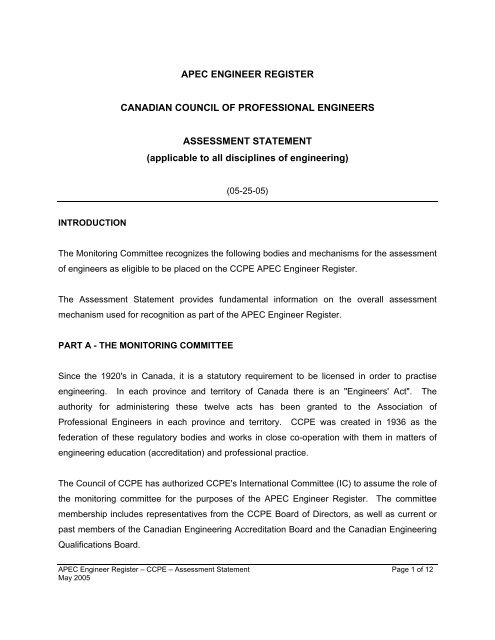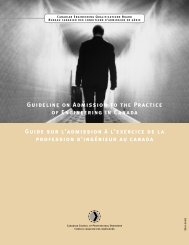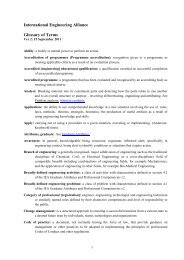APEC ENGINEER REGISTER - Washington Accord
APEC ENGINEER REGISTER - Washington Accord
APEC ENGINEER REGISTER - Washington Accord
Create successful ePaper yourself
Turn your PDF publications into a flip-book with our unique Google optimized e-Paper software.
<strong>APEC</strong> <strong>ENGINEER</strong> <strong>REGISTER</strong><br />
CANADIAN COUNCIL OF PROFESSIONAL <strong>ENGINEER</strong>S<br />
ASSESSMENT STATEMENT<br />
(applicable to all disciplines of engineering)<br />
(05-25-05)<br />
INTRODUCTION<br />
The Monitoring Committee recognizes the following bodies and mechanisms for the assessment<br />
of engineers as eligible to be placed on the CCPE <strong>APEC</strong> Engineer Register.<br />
The Assessment Statement provides fundamental information on the overall assessment<br />
mechanism used for recognition as part of the <strong>APEC</strong> Engineer Register.<br />
PART A - THE MONITORING COMMITTEE<br />
Since the 1920's in Canada, it is a statutory requirement to be licensed in order to practise<br />
engineering. In each province and territory of Canada there is an "Engineers' Act". The<br />
authority for administering these twelve acts has been granted to the Association of<br />
Professional Engineers in each province and territory. CCPE was created in 1936 as the<br />
federation of these regulatory bodies and works in close co-operation with them in matters of<br />
engineering education (accreditation) and professional practice.<br />
The Council of CCPE has authorized CCPE's International Committee (IC) to assume the role of<br />
the monitoring committee for the purposes of the <strong>APEC</strong> Engineer Register. The committee<br />
membership includes representatives from the CCPE Board of Directors, as well as current or<br />
past members of the Canadian Engineering Accreditation Board and the Canadian Engineering<br />
Qualifications Board.<br />
<strong>APEC</strong> Engineer Register – CCPE – Assessment Statement Page 1 of 12<br />
May 2005
The contact person is:<br />
Ms. Marie Carter, P.Eng.<br />
Director, Professional and International Affairs<br />
Canadian Council of Professional Engineers<br />
1100 - 180 Elgin Street<br />
Ottawa, Ontario<br />
Canada<br />
K2P 2K3<br />
TEL: 613-232-2474 ext. 245<br />
FAX: 613-230-5759<br />
EML: marie.carter@ccpe.ca<br />
WEB:www.ccpe.ca<br />
GENERAL ENQUIRIES: international.affairs@ccpe.ca<br />
<strong>APEC</strong> Engineer Register – CCPE – Assessment Statement Page 2 of 12<br />
May 2005
PART B - ASSESSMENT MECHANISMS<br />
Eligibility for admission to the CCPE <strong>APEC</strong> Engineer Register is limited to engineers<br />
registered with one of the constituent members of CCPE (see Attachment 1). Such<br />
registrants are entitled to be called Professional Engineers (P.Eng.) or, in Québec,<br />
ingénieur (ing.).<br />
1. Accreditation or Recognition of Higher Engineering Education Programs<br />
1a. Accreditation of Engineering Programs<br />
A graduate of a Canadian engineering program that has been accredited by the Canadian<br />
Engineering Accreditation Board (CEAB) is considered to have met the academic qualification<br />
requirement. The criteria and procedures for accreditation of engineering programs are<br />
provided in Attachment 2 (Canadian Engineering Accreditation Board 2002 Accreditation<br />
Criteria and Procedures). The CEAB (formerly CAB) was created in 1965.<br />
A graduate of a foreign engineering program that is evaluated by the CEAB as substantially<br />
equivalent to a CEAB-accredited program is considered to have met the academic qualification<br />
requirement. The policies governing substantial equivalence are described in Attachment 3<br />
(Polices and Procedures for CEAB Substantial Equivalency Evaluations).<br />
A graduate of a foreign engineering program that is covered by a CCPE mutual recognition<br />
agreement is considered to have met the academic qualification requirement, subject to specific<br />
details of that agreement. A list of current agreements is provided in Attachment 4. The CCPE<br />
is a signatory and full participant in the <strong>Washington</strong> <strong>Accord</strong>.<br />
Over 90% of professional engineers qualify using this route.<br />
<strong>APEC</strong> Engineer Register – CCPE – Assessment Statement Page 3 of 12<br />
May 2005
1b. Alternative Assessment Mechanisms<br />
Individuals who have not completed an accredited or recognized engineering program can meet<br />
the academic requirement through an examination program. Upon application to one of the<br />
CCPE constituent members, an individual's academic qualifications will be assessed and a<br />
specific examination program assigned based on the Canadian Engineering Qualifications<br />
Board Examination Syllabus (Attachment 5). There are two types of examination programs - a<br />
confirmatory program and an assigned program. Upon successful completion of either<br />
examination program, the candidate is deemed to have satisfied the academic qualification<br />
requirement.<br />
In some jurisdictions, candidates with more than ten years of engineering experience, may have<br />
the examination program waived in whole or in part following a professional interview. A<br />
description of a typical professional interview appears in Attachment 6.<br />
2. Assessment for Independent Practice<br />
The practice of engineering in Canada is regulated at the provincial and territorial level by an<br />
Association of Professional Engineers. Each of these bodies has the legislative authority to<br />
admit members to the profession and to govern their practice.<br />
In addition to the academic requirements for licensure described above, there are requirements<br />
for a supervised period of engineering experience, the ability to communicate effectively in the<br />
language of business of the jurisdiction, successful completion of a professional practice<br />
examination, and validation of experience and ability through at least three sponsors. Each of<br />
these requirements is discussed below.<br />
<strong>APEC</strong> Engineer Register – CCPE – Assessment Statement Page 4 of 12<br />
May 2005
2a. Engineering Experience Requirement<br />
All applicants are required to have a minimum of four years of acceptable engineering<br />
experience prior to registration. (Currently registration in the province of Québec only requires<br />
three years of experience prior to registration.) Acceptable engineering experience must<br />
include the application of theory and should provide exposure to or experience in the following<br />
broad areas: practical experience, management, communication and the social implications of<br />
engineering. Each of these areas is described in Attachment 7 (Admission to the Practice of<br />
Engineering in Canada).<br />
In practice, candidates may require more than four years to accumulate satisfactory experience.<br />
At least one year of experience must be acquired in Canada or in a "Canadian environment".<br />
2b. Language Requirement<br />
Applicants must demonstrate their ability to communicate effectively, both orally and in writing,<br />
in the language of commerce in the province or territory of registration. In all provinces and<br />
territories except for Quebec, the language of commerce is English. For the province of Quebec<br />
and also New Brunswick, the language of commerce is French. Methods used to assess<br />
language competency should specifically include testimony of professional engineers who act<br />
as referees in support of the candidate's registration application. Other methods may include<br />
specific language tests.<br />
2c. Professional Practice Examination<br />
All candidates for registration are required to successfully complete an examination to confirm<br />
that they have sufficient knowledge of the ethical considerations and obligations that<br />
accompany the privileges of professional status, as well as the legal concepts relevant to<br />
professional engineers.<br />
<strong>APEC</strong> Engineer Register – CCPE – Assessment Statement Page 5 of 12<br />
May 2005
A detailed description of the range of knowledge that should be examined is provided in<br />
Attachment 8 (Professional Practice Examination).<br />
2d. Validation of Experience (Sponsorship)<br />
There must be at least three references from practising professional engineers who are familiar<br />
with details of the candidate's work for the experience claimed. Candidate's present and past<br />
employers are the most suitable referees. If there have been multiple work situations, more<br />
referees may be required.<br />
Referees should provide information regarding the candidate's technical competence in the<br />
application of engineering principles and theory, ability to communicate, ability to work on a<br />
team, ability to exercise professional judgement, and whether the candidate is of good character<br />
and repute as demonstrated through personal attributes such as integrity and responsibility. A<br />
typical referee form is in Attachment 9.<br />
3. Particular <strong>APEC</strong> Engineer Assessment Items<br />
3a, b. Seven Years Experience after Graduation; Two years in Responsible Charge of<br />
Significant Engineering Work<br />
CCPE's definition of the practice of professional engineering appears in Attachment 10. By<br />
virtue of professional registration, the candidate will have met four years of this experience<br />
requirement. The candidate will be asked to submit a report verifying that he/she has<br />
completed an additional three years of experience describing the level of responsibility and the<br />
significance of the engineering work. The report must demonstrate that the individual has<br />
engaged in professional practice which, directly or indirectly, calls upon their engineering<br />
knowledge, skills, experience and judgement, and has a significant influence on the technical<br />
direction of engineering projects or programs.<br />
<strong>APEC</strong> Engineer Register – CCPE – Assessment Statement Page 6 of 12<br />
May 2005
To be "significant", an engineering work must:<br />
- represent an application of the knowledge of a particular discipline that goes beyond<br />
standard solutions found in manuals of practice;<br />
- be done in an environment where the engineer has full autonomy and responsibility;<br />
- show evidence that the accomplishment requires a synthesis capability that only those<br />
who fully appreciate the various interactions of the topics of their discipline will have;<br />
- be a significant part of a total engineering project, where it is clearly demonstrated that<br />
the candidate understands the total project concept.<br />
3c. Professional Development<br />
Engineers are bound by their Code of Ethics (see Attachment 11) to practise only in areas in<br />
which they are competent. Further, engineers have a responsibility to keep themselves<br />
informed in order to maintain their competence, to strive to advance the body of knowledge<br />
within which they practise and to provide opportunities for the professional development of their<br />
subordinates.<br />
Some CCPE constituent members have implemented continuing competency/professional<br />
development (CPD) programs. For those jurisdictions, submission of a candidate's continuing<br />
competence record will satisfy the requirement. For those jurisdictions without formal continuing<br />
competency programs, candidates must submit evidence of compliance with the CCPE<br />
guideline (Attachment 12). In CCPE's guideline, the terms "continuing (engineering) education"<br />
and "professional development" are interchangeable and may include formal or informal training<br />
or practice devoted to enhancing the engineer's skills, knowledge and ability to practise<br />
engineering in terms of the application of theory, management of engineering, communication,<br />
or understanding the social implications of engineering. There is no single method for<br />
maintaining and enhancing one's knowledge in a specific area of practice. Acceptable methods<br />
will probably include a combination of technical work in one's field of specialization; attendance<br />
at seminars, workshops, conferences, university courses; preparation and publication of papers;<br />
participation in professional or technical societies.<br />
<strong>APEC</strong> Engineer Register – CCPE – Assessment Statement Page 7 of 12<br />
May 2005
3d. Compliance with Code of Conduct<br />
All professional engineers are bound by the Code of Conduct of the Association of Professional<br />
Engineers with which they are registered. See Attachment 13 (Professional Engineering<br />
Practice in Canada). The application for admittance to the register will require the submission of<br />
a statement from the jurisdictions in which the candidate is registered that the candidate is a<br />
member in good standing.<br />
4. Audit of <strong>APEC</strong> Engineers<br />
The audit provides for a Declaration of Compliance by the registrant each year and provides for<br />
random audit of current C.V. and records of CPD activities over the past three years.<br />
C. <strong>ENGINEER</strong>ING DISCIPLINES<br />
The engineering disciplines recognized for the purposes of the <strong>APEC</strong> Engineer Register are:<br />
Civil<br />
Structural<br />
Geotechnical<br />
Environmental<br />
Mechanical<br />
Electrical<br />
Industrial<br />
Mining<br />
Chemical<br />
Information<br />
Bioengineering<br />
<strong>APEC</strong> Engineer Register – CCPE – Assessment Statement Page 8 of 12<br />
May 2005
Although the constituent members of CCPE do not register professional engineers by discipline,<br />
the CCPE agrees for the purpose of the <strong>APEC</strong> Engineer Register, to identify the discipline in the<br />
context of which such engineers were originally assessed for entry to the profession.<br />
D. RIGHT TO PRACTICE STATEMENT<br />
Participation in the International Registers is intended to facilitate the exchange of information<br />
and to engender further discussion, aimed potentially, at the development of Mutual<br />
Recognition Agreements (MRAs) that recognize the qualifications of registrants of signatory<br />
countries. However, each Canadian province or territory has the exclusive authority to<br />
determine the acceptability of a registrant’s qualifications for admission/licensing and to issue a<br />
license to practise professional engineering in its jurisdiction.<br />
There are 12 associations/Ordre of professional engineers, one in each of the ten provinces and<br />
two to serve the three territories. All 12 associations/Ordre recognize the CCPE National<br />
Guideline for Admission to the Practice of Engineering in Canada, which outlines the criteria for<br />
obtaining a license to practise engineering. However, each of the associations/Ordre uses its<br />
own application for license form and follows its own admission/licensing procedures.<br />
The <strong>APEC</strong> Register does not confer upon a registrant the legal right to practise in a Canadian<br />
province or territory. Registrants will still be required to apply to the association/Ordre in the<br />
province or territory, where they wish to practise professional engineering, and will be required<br />
to fulfill the stipulated requirements for licensure.<br />
The use of the titles “<strong>APEC</strong> Engineer” or “Professional Engineer” as may be respectively<br />
conferred to an individual by another signatory to the <strong>APEC</strong> is not permitted in Canada without a<br />
valid license in a Canadian province or territory.<br />
<strong>APEC</strong> Engineer Register – CCPE – Assessment Statement Page 9 of 12<br />
May 2005
Role of CCPE in Engineering Licensure<br />
CCPE has no legislated role in engineering licensure or conferring the legal right to practise<br />
professional engineering. In Canada, the practice of professional engineering is regulated by the<br />
provincial or territorial association of professional engineers. Each of these organizations has<br />
the legislative authority to regulate the practice of professional engineering in its jurisdiction.<br />
Professional engineering regulation entails the setting of the admission/licensing standards,<br />
granting licenses to practise to qualified individuals and governing them to ensure that the public<br />
is safeguarded where the practice of professional engineering is involved.<br />
The laws of every province or territory require engineering practitioners to be licensed in order<br />
to be authorized to engage in the practice of engineering and to use the title “Professional<br />
Engineer” (or the abbreviation P.Eng); or, in Province of Québec, to use the title “Engineer” or<br />
“ingénieur” (or the corresponding abbreviation, Eng. or ing.).<br />
In order to gain the legal right to practise professional engineering in a particular province or<br />
territory, an individual must apply to the association/Ordre in that jurisdiction to have their<br />
qualifications assessed. An individual who satisfies the admission/licensing requirements and is<br />
granted a license by a particular provincial or territorial association/Ordre is licensed only in that<br />
jurisdiction, and must apply for a license to practise in any other Canadian jurisdiction in which<br />
they wish to practise. To maintain their license and the privileges attendant, the engineer must<br />
adhere to the policies stipulated by that association/Ordre.<br />
The admission/licensing criteria include satisfying established academic and engineering work<br />
experience standards, language proficiency, passing a Professional Practice Examination<br />
(PPE), on engineering ethics, professionalism, and engineering law, and validation of a<br />
applicant’s practice by professional engineer referees who are familiar with the applicant’s<br />
technical capabilities and are able to comment on their character and overall suitability for<br />
licensure.<br />
Specific information about the admission/licensing process and application forms to obtain a<br />
license to practise engineering in a particular Canadian province or territory is available directly<br />
<strong>APEC</strong> Engineer Register – CCPE – Assessment Statement Page 10 of 12<br />
May 2005
from the local association/Ordre. Addresses and contact information for any of the 12<br />
associations/Ordre may be accessed through the CCPE website at www.ccpe.ca.<br />
Role of CCPE in International Mobility of Engineering Practitioners<br />
The CCPE is the national and international voice of the Canadian engineering profession and it<br />
conducts work in international affairs. Its functions include international representation of the<br />
Canadian engineering profession, the negotiation of international agreements and memoranda<br />
of understanding, as well as administration of the national portion of international registers, such<br />
as the Asia-Pacific Economic Co-operation (<strong>APEC</strong>) Register and the International Register of<br />
Professional Engineers under the Engineers Mobility Forum (EMF).<br />
CCPE negotiates international agreements on behalf of its Constituent Member<br />
associations/Ordre. However, these agreements are not binding on the associations/Ordre who<br />
reserve(s) the right to ratify them or not.<br />
<strong>APEC</strong> Engineer Register – CCPE – Assessment Statement Page 11 of 12<br />
May 2005
List of Attachments<br />
Attachment 1 List of Constituent Members of CCPE<br />
Attachment 2 Canadian Engineering Accreditation Board 2004 Accreditation Criteria<br />
and Procedures<br />
Attachment 3 Polices and Procedures for CEAB Substantial Equivalency Evaluations<br />
Attachment 4 CCPE List of Mutual Recognition Agreements<br />
Attachment 5 Canadian Engineering Qualifications Board Examination Syllabus 1998<br />
Edition<br />
Attachment 6 Description of a Typical Interview Process<br />
Attachment 7 CCPE Guideline - Admission to the Practice of Engineering in Canada;<br />
Attachment 8 CCPE Guideline - Professional Practice Examination<br />
Attachment 9 Typical Referee Form<br />
Attachment 10 CCPE Guideline - Definition of the Practice of Professional Engineering<br />
Attachment 11 CCPE Guideline - Code of Ethics<br />
Attachment 12 CCPE Guideline – Continuing Professional Development and Continuing<br />
Competence for Professional Engineers<br />
Attachment 13 CCPE Guideline - Professional Engineering Practice in Canada<br />
Attachment 14 CCPE Guideline – For Engineer-in-Training Program<br />
<strong>APEC</strong> Engineer Register – CCPE – Assessment Statement Page 12 of 12<br />
May 2005




